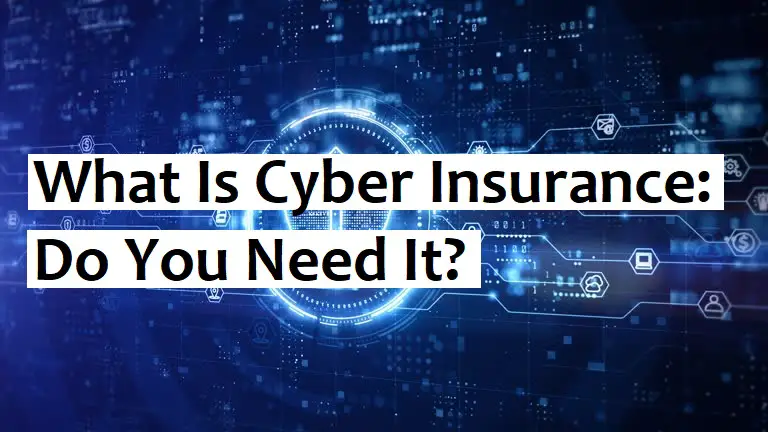In today’s digital-first world, cyber threats are no longer just a concern for large corporations. From small businesses to independent contractors, anyone operating online is a potential target for cybercriminals. This has led to the growing importance of a relatively new form of coverage known as cyber insurance. But what is cyber insurance, and do you really need it? In this comprehensive guide, we’ll explore everything you need to know about cyber insurance, including its coverage, benefits, and whether it’s a smart investment for your business or personal use.
Understanding Cyber Insurance
Cyber insurance, also referred to as cyber liability insurance, is a type of insurance policy designed to protect individuals and businesses from financial losses resulting from cyberattacks, data breaches, and other internet-based threats. It covers costs related to data recovery, legal fees, reputational damage, regulatory fines, and more.
The increasing frequency and sophistication of cyber threats have made this type of insurance essential in today’s interconnected environment. Whether you’re managing a company website, storing customer data, or accepting online payments, cyber insurance can serve as a crucial safety net.

Why Cyber Insurance Matters
Cyber incidents can lead to devastating consequences. A data breach can expose sensitive customer information, damage your reputation, and lead to costly lawsuits or regulatory penalties. Cyber insurance offers financial support and expert assistance to help you navigate these situations.
Here are a few key reasons why cyber insurance is important:
- Escalating cybercrime: Ransomware attacks, phishing scams, and data breaches are on the rise.
- High recovery costs: Restoring systems, hiring experts, and notifying affected parties can be expensive.
- Legal obligations: Data protection laws often require businesses to take steps after a breach.
- Customer trust: Demonstrating that you are protected by cyber insurance can enhance customer confidence.
What Does Cyber Insurance Cover?
Cyber insurance coverage can vary depending on the provider and policy, but it generally falls into two broad categories:
- First-party coverage: Covers direct losses to the insured party.
- Third-party coverage: Covers claims made by others affected by a cyber event.
Let’s take a closer look at typical coverage options:
First-Party Coverage:
- Data loss and restoration: Costs associated with recovering lost or corrupted data.
- Business interruption: Income lost due to network downtime or operational disruption.
- Ransom payments: Coverage for extortion-related demands (e.g., ransomware).
- Notification costs: Expenses related to informing affected customers or employees.
- Crisis management: PR services to mitigate reputational damage.
- Cyber forensics: Investigation costs to determine how the breach occurred.
Third-Party Coverage:
- Legal defense and settlements: Coverage for lawsuits stemming from a breach.
- Regulatory fines and penalties: Costs from violating data protection laws (in regions where insurable).
- Liability for compromised data: Includes customer, client, or vendor data losses.
- Media liability: Protection against defamation, copyright infringement, or privacy violation claims.
What Cyber Insurance Typically Does NOT Cover
While cyber insurance can be comprehensive, there are exclusions. Policies often do not cover:
- Losses due to negligence or poor cybersecurity hygiene
- Uninsurable fines (in certain jurisdictions)
- Physical damage from cyber attacks
- Pre-existing incidents before the policy start date
- War or state-sponsored attacks (may vary by provider)
Who Needs Cyber Insurance?
Any business that uses technology or stores data can benefit from cyber insurance. Here are examples of who should seriously consider it:
- Small to medium-sized businesses (SMBs): Often lack the resources to recover quickly from a cyberattack.
- E-commerce businesses: Handle transactions and store customer payment information.
- Healthcare providers: Manage sensitive patient data regulated under HIPAA.
- Financial services: Handle client financial data, making them high-value targets.
- Educational institutions: Store student and faculty personal data.
- Remote workers and freelancers: Depend on cloud services and personal devices.
How Much Does Cyber Insurance Cost?
Premiums vary widely based on several factors:
- Business size and revenue
- Industry
- Type and volume of data collected
- Existing cybersecurity measures
- Claims history
- Policy limits and deductibles
On average, small businesses can expect to pay between $500 to $5,000 annually for a standard cyber insurance policy. High-risk sectors may face higher costs.
How to Choose the Right Cyber Insurance Policy
Choosing the right policy involves understanding your risk profile and ensuring the coverage meets your unique needs. Here are some steps to follow:
- Conduct a risk assessment: Identify potential cyber threats and data vulnerabilities.
- Evaluate existing security measures: Insurers may offer lower rates for businesses with strong cybersecurity protocols.
- Compare policies: Look at coverage options, exclusions, limits, and deductibles.
- Read the fine print: Make sure you understand what’s included and excluded.
- Consult an insurance broker: They can help match you with the right provider.
Tips for Maximizing Your Cyber Insurance Benefits
To get the most out of your cyber insurance policy:
- Keep your cybersecurity measures up to date.
- Regularly back up your data and test your recovery systems.
- Train employees on cybersecurity awareness.
- Monitor your systems continuously for unusual activity.
- Maintain detailed documentation for all security protocols and updates.
Is Cyber Insurance Worth It?
Given the increasing risk of cyber threats and the potentially devastating consequences of a breach, cyber insurance is a worthwhile investment for most organizations. It provides peace of mind, financial protection, and access to specialized resources that can be vital during a crisis.
Think of cyber insurance as an essential part of your overall risk management strategy. While it doesn’t replace the need for strong cybersecurity practices, it adds an important layer of protection.
Cyber Insurance and Regulatory Compliance
Many data privacy laws, such as the GDPR in Europe or CCPA in California, impose strict obligations on how businesses handle personal information. Non-compliance can result in hefty fines. Cyber insurance can help cover:
- Notification requirements
- Legal fees
- Government investigations
- Public relations efforts
Some policies are specifically designed to meet regulatory requirements. Be sure to discuss compliance coverage when shopping for a policy.
The Future of Cyber Insurance
As technology evolves, so too does the threat landscape. Expect cyber insurance to adapt in the following ways:
- Increased personalization: Tailored policies for different industries or risk profiles.
- Integration with cybersecurity services: Insurers may offer tools, software, or training.
- Premium incentives: Discounts for proactive risk management.
- Greater focus on AI and automation: As threats become more automated, policies may shift to address these challenges.
Conclusion
Cyber insurance is no longer a luxury—it’s a necessity in a digital world. Whether you’re a small business owner, freelancer, or part of a larger organization, this form of protection can shield you from significant financial and reputational harm.
While no insurance policy can prevent an attack, cyber insurance ensures you’re not alone in dealing with the aftermath. Invest in a policy that aligns with your business operations, regularly update your security measures, and make cyber resilience a priority.
If this article was informative also checkout: Natural-Disasters And Home Insurance
also checkout: Click Here



